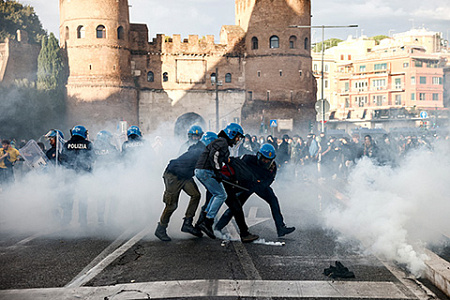
By raising the issue of confidence in the government of Giorgi Meloni, the Italian Senate has achieved final approval of the decree “On security”, thereby turning it into a law. It introduces harsher penalties for protest-related offenses such as property damage and sit-ins, and also allows intelligence officers and police officers to commit certain crimes “for national security purposes” without incurring liability.
The vote was preceded by a stormy meeting in the Madama Senate Palace, which was forced to be interrupted due to opposition protests. Its representatives are unhappy that their proposed more than 900 amendments to the document were left without consideration. With 109 votes in favor and 69 votes against, with one abstention, the Senate passed a vote of confidence in the ruling cabinet and thereby converted the decree into law.
“With the final adoption of the decree on security in the Senate,” Il Giornale newspaper quoted Meloni as saying after the vote, “the government is taking a decisive step towards strengthening the protection of citizens, the most vulnerable groups of the population and our men and women in uniform.”
And the newspaper Il Fatto Quotidiano, commenting on the adoption of the law, draws attention to the fact that it says “22 new crimes and aggravating circumstances,” as well as “a number of repressive provisions.”
In particular, we are talking about the blocking of transport communications, which is transformed from a simple administrative offense punishable by a fine of 1 thousand to 4 thousand euros into a criminal offense. “Obstruction of free movement by road or railway” by one person or “committed by several persons gathered together” now carries a prison sentence of six months to two years.
In this context, we can also consider a number of “aggravating circumstances” related to resistance to law enforcement officers, for which the penalty is increased three times. First of all, we are talking about protest actions “in order to prevent the construction of infrastructure.”
As an example, the No Tav movement, born in the 1990s, whose members are opponents of the Leon-Turin high–speed Transalpine railway, which runs in the Val di Susa Valley, and regularly hold demonstrations, usually ending in clashes with police and Carabinieri. A movement is now intensifying in southern Italy against the construction of a bridge across the Strait of Messina, which is supposed to connect Sicily and Calabria.
The government’s initiative, before it became law, has already sparked demonstrations across Italy. Human rights organizations have accused the government of criminalizing dissent, restricting civil liberties and the right to protest.
“This law is a repressive, ideological and ineffective measure,” said Paolo Ciani, a deputy from the leftist Christian Opposition Party. According to Article 10 of the law, laziness is considered “unauthorized occupation of real estate intended for the residence of other persons,” punishable by imprisonment for a term of two to seven years. At the same time, the newspaper draws attention to the fact that the Italian Criminal Code already has three types of such crimes: “Invasion of land or a building”, “Invasion of land or a building that poses a threat to public health or public safety” and “Violent violation of the right to own real estate”, which They provide for prison terms from two to six years.
A heated discussion was sparked by the provisions of article 31 of the law concerning “strengthening information activities for security purposes,” that is, special services. In particular, we are talking about “strengthening agent activity”, which exempts undercover agents from any criminal liability who “participate in terrorist and subversive associations.” The publication notes that relatives of victims of mafia and terrorist crimes, which are “the darkest pages of national history,” regard this as a “criminal license.”
The law also provides “special legal protection” to police or military personnel who may be subject to investigation in connection with their official activities. According to Meloni, these law enforcement officers “will be able to continue their work, and the state will cover their legal costs in the amount of up to 10,000 euros for each stage of the proceedings.” At the same time, criminal liability is imposed for causing bodily injury to a policeman.
One of the most controversial articles concerns the abolition of deferred punishment for pregnant women and mothers with children under one year old. They may now end up in prison or, more precisely, in Institutions of a light regime for incarcerated mothers. This should have an impact on crime among street thieves who use pregnancy to avoid punishment.
Milan
